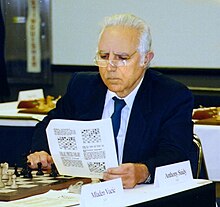
Tigran Vardani Petrosian was a Soviet-Armenian chess grandmaster and the ninth World Chess Champion from 1963 to 1969. He was nicknamed "Iron Tigran" due to his almost-impenetrable defensive playing style, which emphasized safety above all else. Petrosian is often credited with popularizing chess in Armenia.

Reuben C. Fine was an American chess player, psychologist, university professor, and author of many books on both chess and psychology. He was one of the strongest chess players in the world from the mid-1930s until his retirement from chess in 1951. He was granted the title of International Grandmaster by FIDE in 1950, when titles were introduced.

Samuel Herman Reshevsky was a Polish chess prodigy and later a leading American chess grandmaster. He was a contender for the World Chess Championship from the mid-1930s to the mid-1960s: he tied for third place in the 1948 World Chess Championship tournament, and tied for second in the 1953 Candidates tournament. He was an eight-time winner of the US Chess Championship, tying him with Bobby Fischer for the all-time record.

Robert Eugene Byrne was an American chess player and chess author who held the FIDE title of Grandmaster (GM). He won the U.S. Championship in 1972, and was a World Chess Championship Candidate in 1974. Byrne represented the United States nine times in Chess Olympiads from 1952 to 1976 and won seven medals. He was the chess columnist from 1972 to 2006 for The New York Times, which ran his final column on November 12, 2006. Byrne worked as a university professor for many years, before becoming a chess professional in the early 1970s.

Larry Melvyn Evans was an American chess player, author, and journalist who received the FIDE title of Grandmaster (GM) in 1957. He won or shared the U.S. Chess Championship five times and the U.S. Open Chess Championship four times. He wrote a long-running syndicated chess column and wrote or co-wrote more than twenty books on chess.
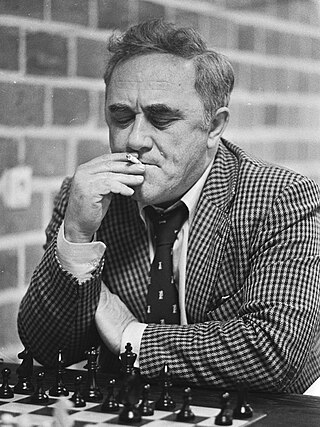
Efim Petrovich Geller was a Soviet chess player and world-class grandmaster at his peak. He won the Soviet Championship twice and was a Candidate for the World Championship on six occasions. He won four Ukrainian SSR Championship titles and shared first in the 1991 World Seniors' Championship, winning the title outright in 1992. His wife Oksana was a ballet dancer while his son Alexander was also a chess master. Geller was coach to World Champions Boris Spassky and Anatoly Karpov. He was also an author.
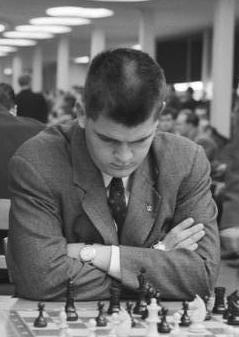
William James Joseph Lombardy was an American chess grandmaster, chess writer, teacher, and former Catholic priest. He was one of the leading American chess players during the 1950s and 1960s, and a contemporary of Bobby Fischer, whom he seconded during the World Chess Championship 1972. He won the World Junior Chess Championship in 1957, the only person to win that tournament with a perfect score. Lombardy led the U.S. Student Team to Gold in the 1960 World Student Team Championship in Leningrad.

Robert James Fischer was an American chess grandmaster and the eleventh World Chess Champion. A chess prodigy, he won his first of a record eight US Championships at the age of 14. In 1964, he won with an 11–0 score, the only perfect score in the history of the tournament. Qualifying for the 1972 World Championship, Fischer swept matches with Mark Taimanov and Bent Larsen by 6–0 scores. After winning another qualifying match against Tigran Petrosian, Fischer won the title match against Boris Spassky of the USSR, in Reykjavík, Iceland. Publicized as a Cold War confrontation between the US and USSR, the match attracted more worldwide interest than any chess championship before or since.
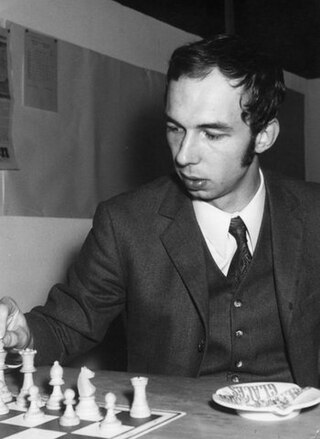
Lubomir (Lubosh) Kavalek was a Czech-American chess player. He was awarded both the International Master and International Grandmaster titles by FIDE in 1965. He won two Czechoslovak and three U.S. championships, and was ranked as the world's No. 10 player in 1974. He was inducted into the U.S. Chess Hall of Fame in 2001. Kavalek was also a chess coach, organizer, teacher, commentator, author and award-winning columnist.
Duncan Suttles is a chess grandmaster. Canada's second grandmaster after Abe Yanofsky, Suttles was recognized internationally for the originality of his strategic play in the mid-1960s and 70s. He retired from competitive chess in 1985.

Milan Matulović was a chess grandmaster who was the second or third strongest Yugoslav player for much of the 1960s and 1970s behind Svetozar Gligorić and possibly Borislav Ivkov. He was primarily active before 1977, but remained an occasional tournament competitor until 2006.
Charles Ivars Kalme was a Latvian American chess master and a mathematician.
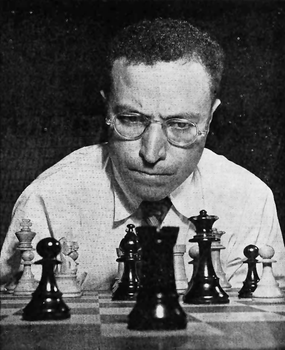
Anthony Edward Santasiere was an American chess master and chess writer, who also wrote extensively on non-chess topics. Santasiere was a middle school mathematics teacher by profession. Santasiere won the 1945 U.S. Open Chess Championship, four New York State championships, and six Marshall Chess Club championships. He competed in four U.S. Chess Championships, with his best finish being a tie for third in 1946. He was a chess organizer.

Charles Jaffé (Jaffe) was a chess master and chess author born in the Russian Empire.
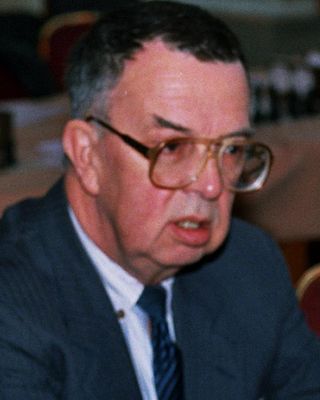
Nikolai Vladimirovich Krogius was a Russian chess Grandmaster, International Arbiter (1985), psychologist, chess coach, chess administrator, and author. He won several tournament titles at Sochi and in Eastern European events, and appeared in seven Soviet finals from 1958–71. His peak was in 1967 when he ranked 18th in the world for a time. He earned his doctorate in psychology, and specialized in sports psychology. He coached World Champion Boris Spassky for several years, also served as chairman of the USSR Chess Federation, and co-authored five chess books. He was the co-winner of the 1993 World Senior Chess Championship.
George Nelson Treysman was an American chess Master.
Norman Lessing was an American television screenwriter and producer, playwright, chess master, and chess writer.
Arthur William Feuerstein was an American chess master, and winner of the first U.S. Armed Forces Chess Championship in 1960. He represented the United States twice in FIDE Student Olympiads.

Asa Hoffmann is a FIDE Master in chess, chess teacher and author from the United States of America. He is known as "the sparring partner of champions". His peak regular USCF rating is 2471, his peak quick rating is 2515 and his peak blitz rating is 2414.

Viktor Lvovich Korchnoi was a Soviet and Swiss chess grandmaster (GM) and chess writer. He is considered one of the strongest players never to have become World Chess Champion.
